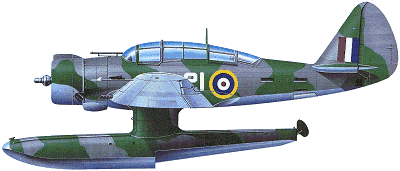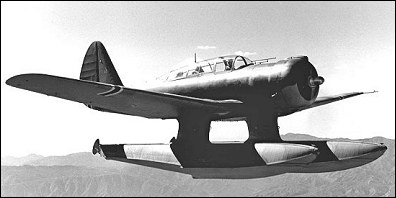|
| In 1940 Northrop received an order from
a Norwegian Buying Commission for the
design and construction of a single-engine
monoplane patrol bomber with
twin floats. The Norwegian order
covered 24 aircraft, and in less than eight
months the Northrop N-3PB prototype
flew, on 1 November 1940,
powered by an 895kW
Wright Cyclone GR-1820 radial engine. It
attained a speed of 414km/h
and was then claimed to be the world's
fastest military seaplane.
Norway was invaded by the Germans
shortly after the contract had been
awarded, and the N-3PBs were therefore
delivered to a unit of the Royal Norwegian
Naval Air Service, operating as
an RAF unit from unimproved coastal
sites in Iceland on anti-submarine patrol
and convoy escort duties. All maintenance
had to be performed in the
open, often under extremely harsh environmental
conditions, and during 19
months of 1941-42 several were lost
during water landings in severe arctic
weather, but there were no losses due
to enemy action. An aircraft was destroyed
as late as 1965, in the collapse of a
snow-laden hangar, but in the early
1980s an N-3PB was located and restored
in Norwegian colours by the
manufacturers.

 | A three-view drawing (800 x 324) |
| Klaatu83, e-mail, 30.12.2015 16:03 The photo shows one of the Northrop aircraft being flight-tested over California. The small stripes painted on the leading edge of the wings were the pre-WW-II Norwegian national insignia. The painting shows one of the aircraft as they appeared when deployed operationally in Iceland with No. 330 (Norwegian) Squadron. Although the aircraft were painted in RAF markings they still belonged to Norway and No. 330 Squadron was officially a Royal Norwegian Naval Air Service unit. The unit continued to operate for the remainder of the war, moving to Scotland during 1943 and exchanging their Northrop seaplanes for Short Sunderlands. reply | | George Sterling, e-mail, 03.12.2013 02:32 My first job out of High School was at Northrop working on the N-3PB. I help install the fixed and flex guns. The aircraft was shipped to Lake Elsinore CA.where the wings were installed,flight tested and turnover to the Norwegian pilots. reply | | gerald holzman, e-mail, 25.04.2012 02:50 In my opinion this aircraft ranks as one of the most beautiful planes of its type ever produced. I wish I were able to see the one that was restored and on display in Los Angeles. reply | | bombardier, e-mail, 23.05.2011 15:58 A landplane version would have been an excellent dive bomber reply | |
| | Klaatu83, e-mail, 08.01.2011 17:18 The N-3PB demonstrated how the fact that an aircraft was built in only small numbers did not necessarily indicate that it was bad or unsuccessful. A small number of these airplanes were built to fulfill a specific Norwegian government requirement, only enough to equip a single squadron. However, they proved to be very successful in their allotted role, and compared very favorably with other equivalent aircraft. The only reason more weren't built was simply because neither the U.S. Navy, nor the any of the other Allied nations, had any requirement for aircraft of this category. reply | | Stephen Sawyer, e-mail, 30.10.2008 20:43 The pylon type of mount of the pontoon to the wing or underside is unique and had to be extremely strong to
accept wave loads. Streamlined without struts, braces,
cross ties or wires. I'd like to see the blueprints
or engineering of these pylons and apply to current
project. Are drawings available ? reply |
|
Do you have any comments?
|
| 
COMPANY
PROFILE
All the World's Rotorcraft
|








